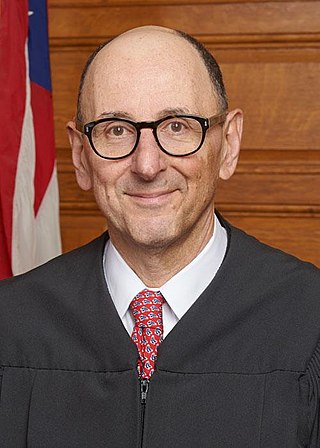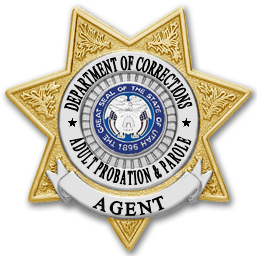In United States criminal law, probable cause is the legal standard by which police authorities have reason to obtain a warrant for the arrest of a suspected criminal and for a court's issuing of a search warrant. One definition of the standard derives from the U.S. Supreme Court decision in the case of Beck v. Ohio (1964), that probable cause exists when “whether at [the moment of arrest] the facts and circumstances within [the] knowledge [of the police], and of which they had reasonably trustworthy information, [are] sufficient to warrant a prudent [person] in believing that [a suspect] had committed or was committing an offense.”
Probation in criminal law is a period of supervision over an offender, ordered by the court often in lieu of incarceration.
Special police usually describes a police force or unit within a police force whose duties and responsibilities are significantly different from other forces in the same country or from other police in the same force, although there is no consistent international definition. A special constable, in most cases, is not a member of a special police force (SPF); in countries in the Commonwealth of Nations and often elsewhere, a special constable is a voluntary or part-time member of a national or local police force or a person involved in law enforcement who is not a police officer but has some of the powers of a police officer.

A probation or parole officer is an official appointed or sworn to investigate, report on, and supervise the conduct of convicted offenders on probation or those released from incarceration to community supervision such as parole. Most probation and parole officers are employed by the government of the jurisdiction in which they operate, although some are employed by private companies that provide contracted services to the government.
Resisting arrest, or simply resisting, is an illegal act of a suspected criminal either fleeing, threatening, assaulting, or providing a fake ID to a police officer during arrest. In most cases, the person responsible for resisting arrest is criminally charged or taken to court.

The Boston University Police Department (BUPD) is the primary law-enforcement agency of Boston University and provides services to more than 41,000 students, faculty, and staff on 132 acres (0.53 km2) of University property and surrounding streets. Its headquarters are located at 32 Harry Agganis Way adjacent to Nickerson Field, in what was once the Braves Field ticket office.

In the United States, a sheriff is the chief of law enforcement of a county. Sheriffs are usually either elected by the populace or appointed by an elected body.
The Commonwealth of Massachusetts is governed by a set of political tenets laid down in its state constitution. Legislative power is held by the bicameral General Court, which is composed of the Senate and House of Representatives. The governor exercises executive power with other independently elected officers: the Attorney General, Secretary of the Commonwealth, and Auditor. The state's judicial power rests in the Supreme Judicial Court, which manages its court system. Cities and towns act through local governmental bodies to the extent that they are authorized by the Commonwealth on local issues, including limited home-rule authority. Although most county governments were abolished during the 1990s and 2000s, a handful remain.

United States federal probation and supervised release are imposed at sentencing. The difference between probation and supervised release is that the former is imposed as a substitute for imprisonment, or in addition to home detention, while the latter is imposed in addition to imprisonment. Probation and supervised release are both administered by the U.S. Probation and Pretrial Services System. Federal probation has existed since 1909, while supervised release has only existed since 1987, when it replaced federal parole as a means for imposing supervision following release from prison.

The Boston Municipal Court (BMC), officially the Boston Municipal Court Department of the Trial Court, is a department of the Trial Court of the Commonwealth of Massachusetts, United States. The court hears criminal, civil, mental health, restraining orders, and other types of cases. The court also has an appellate division which reviews questions of law that arise from civil matters filed in the eight divisions of the department.
Art Bowker is an American author and cybercrime specialist in corrections. His first book, The Cybercrime Handbook for Community Corrections: Managing Risk in the 21st Century, describes the process of supervising cyber-offenders. Bowker, along with Todd G. Shipley, wrote a book called Investigating Internet Crimes, 1st Edition: An Introduction to Solving Crimes in Cyberspace, which provides step-by-step instructions for investigating Internet crimes.
The judiciary of Massachusetts is the branch of the government of Massachusetts that interprets and applies the law of Massachusetts, ensures equal justice under law, and provides a mechanism for dispute resolution. The judicial power in Massachusetts is reposed in the Supreme Judicial Court, which superintends the entire system of courts.
Geraldine S. Hines is an American retired judge who formerly served served as an associate justice of the Massachusetts Supreme Judicial Court from 2014 to 2017. She was nominated in July 2014 by Massachusetts Governor Deval Patrick and confirmed by an 8–0 vote of the Governor's Council. She succeeded Ralph D. Gants, who was promoted to chief justice.
The Delaware State Department of Probation and Parole is the community corrections component of the Delaware Department of Corrections, falling under the Bureau of Community Corrections. The department has five offices throughout the state of Delaware, two in New Castle County, two in Sussex County and one in Kent. Delaware State Community Corrections officers function as both Probation and Parole officers within the state and are endowed with state law enforcement powers, allowing them to perform arrests, detainments and searches and seizures on probationers and parolees within the State of Delaware.

Judge Peter W. Agnes Jr. is a former justice of the Massachusetts Appeals Court as an Associate Justice, having been appointed by Governor Deval Patrick in 2011 and serving until reaching the mandatory retirement age of 70 in 2020. In addition to being an active member of the legal community in providing "…service on numerous Supreme Judicial Court and Bar Association committees, commissions[,]…task forces, [et al.]…," Justice Agnes has also been passionate about education, having taught at the Massachusetts School of Law for the past fifteen years, and continuing to do so currently. Agnes presently resides in Wayland, MA with his wife Eileen Agnes. They have four children and three grandchildren, boasting a passionate relationship with their extensive family outside of their legal careers.

Adult Probation and Parole (AP&P) is a division of the Utah Department of Corrections (UDC) which is a government agency dedicated to the management and supervision of convicted probationers and parolees in the State of Utah. It is currently led by the Division Director Dan Blanchard and is headquartered in the Utah Department of Corrections Administration Building in Draper.

The Georgia Department of Community Supervision (DCS) is an executive branch agency of the U.S. state of Georgia. DCS is headquartered in the James H "Sloppy" Floyd Veterans Memorial Building with additional field offices throughout the state. DCS is tasked with: the supervision and reentry services of felony probationers and parolees; the oversight of adult misdemeanor probation providers; and, provides administrative support to the Georgia Commission on Family Violence (GCFV).
Sentinel Offender Services is a criminal justice services and original equipment manufacturing company based in Anaheim, California. The company was founded in 1993 by Robert Contestabile, who is currently the chairman. Tom Flies is chief executive officer.
In the United States, there is no consistent use of the office of constable throughout the states; use may vary within a state. A constable may be an official responsible for service of process: such as summonses and subpoenas for people to appear in court in criminal and/or civil matters. They can also be fully empowered law enforcement officers. Constables may have additional specialized duties unique to the office. In some states the constable is an elected or appointed position at the state or local level of local government. Their jurisdiction can vary from statewide to county/parish and local township boundaries based on the state's laws.
Griffin v. Wisconsin, 483 U.S. 868 (1987), was a case decided by the Supreme Court of the United States on June 26, 1987. The court decided that the warrantless search of a probationer's residence based on "reasonable grounds" in accordance with a state probation regulation did not violate the Fourth Amendment.









